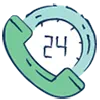Program Overview
Program Overview
-
Popular Subject Areas
Business, Humanities, Agriculture & STEM
-
Location
Dublin
-
Host University
University College Dublin
-
Term
Fall 4 2024
-
Program Dates
Aug 29, 2024 - Dec 21, 2024
-
Program Length
Semester
-
Application Deadline
Apr 01, 2024
-
Forms and Payment Deadline
Apr 15, 2024
-
Credit
20 - 30 ECTS Credits
-
Eligibility
3.00 Minimum GPA*
-
Cost
$24,750
- This session is closed and is no longer accepting applications.
Study Abroad Program Description
The Business, Humanities, Agriculture & STEM program is offered through University College Dublin (UCD). Popular subject areas include Business, History, Engineering, and Agriculture. Unique offerings include UCD's Service Learning course and Scientific Research course. Courses are taught in English by UCD faculty with local and international students. You must choose one main program in which to take four courses, but may take one or two electives from other programs. The main programs to choose from are the following:
Agriculture, Food & Nutrition
Architecture & Planning
Arts & Humanities
Business*
Engineering
Law
Nursing & Midwifery
Pre-Physical Therapy**
Science
Social Sciences
Sport Science
Pre-Vet
*If you choose to enroll in four or more courses from the Business program, you will be required to submit a letter of recommendation and a letter of intent.
**An additional fee could be required for modules within the Pre-Physical Therapy study abroad program. Please speak with the Ireland Program Manager for more information.
Semester + Semester Programs Available: You can combine the Fall + Spring sessions at a discounted price. For more information about this option, please contact your ISA Ireland Program Manager.
Enjoy Flexibility with ISA Flex
We’ve partnered with Arizona State University (ASU) to help you overcome common study abroad challenges by adding an ASU Online course to your ISA program. With more than 2,100 courses to choose from, ISA Flex minimizes academic challenges, like major requirements and limited course options, so you can make the most of your experience abroad. Once you’ve applied, access the Flex form in your ISA Student Portal for more information on how to add this to your program and enroll in the course you need.
*Eligibility
MINIMUM GPA
Students must have a minimum grade point average of 3.00.
You must have at least sophomore standing (second year) at your home university at the time of participation.
What's Included
Comprehensive Advising and Support

24-Hour Emergency
Comprehensive Health, Safety, and Security Support
Airport Reception
Visa Support
Tuition at the Host University
Housing
Bridging Cultures Orientation
Full-Time Resident Staff
On-Site ISA Offices
Internet Access
ISA Discovery Model
Excursions
Cultural Activities
Insurance
Official Transcript from the Host University
Professional Development Toolbox
Scholarship Opportunities
Academics
Credits
ECTS Credits
20 - 30
Recommended U.S. Semester Credits
12 - 18
Recommended U.S. Quarter Units
18 - 27
Academic Information
Course Selection
- You are required to take 4-6 courses per semester.
- You must choose 1 main school in which to take 3 courses, but may take 1-3 elective courses from other schools.
- The main schools to choose from are the following:
- Agriculture, Food & Nutrition*
- Architecture & Planning*
- Arts, Humanities and Social Sciences
- Business
- Engineering*
- Law
- Nursing & Midwifery*
- Science*
- Sport and Exercise
- US and International Affairs
*Extra fees associated with courses, and/or enrollment in extra courses, are the responsibility of the student and non-refundable.
- You can NOT take Education, Veterinary, or Medicine courses.
- You may only take Psychology courses if Psychology majors.
- You can NOT take courses that have course codes that end in a letter instead of a number.
- Courses and course hours of instruction are subject to change.
- Eligibility for courses may be subject to a placement exam and/or prerequisites.
- Requests for sample syllabi can be made to the Ireland Program Manager.
- The courses listed below are only a sampling of what University College Dublin offers. Please see the course catalog, linked below, for additional course options.
Course Credit
- You are required to take 20-30 ECTS credits per semester.
- Transfer credits earned will be decided entirely by your home university. It is important to be in touch with your university about course approvals and transfer credit pre-departure.
- According to ISA policy and possible visa requirements, you must maintain full-time enrollment status, as determined by your home university.
- Per University College Dublin, 5 ECTS credits is equivalent to 2.5 or 3 U.S. semester credits / 3.75 or 4.5 quarter units. Credit transfer is ultimately determined by the student’s home university.
Course Level Recommendations
- ISA offers course level recommendations for the courses listed in the University College Dublin (UCD) program catalog. Please note that the course level recommendations are based on the UCD level classifications of a 1, 2, or 3, which correspond with the three stage bachelor’s degree cycle. Courses classified as level 2 and level 3 are recommended as upper division. These ISA recommendations are intended to facilitate the determination of course equivalencies by advisors and credential evaluators at participants' U.S. home institutions.
Transcript Information
- The transcript from University College Dublin will reflect ECTS credits. Please be in touch with your home university regarding credit transfer for this program.
To access the most up-to-date course catalog for the host university, click the "Go To Course Search" button below. Once on the desired page, select the "Search all Modules" or "Search Modules by School" tiles to see the different course options available to international students.
Go to Host University Course Search Here
Go to Course SearchCourses
select allclear all
Course Disclaimer
- Courses and course hours of instruction are subject to change.
Support & Funding
ISA is here to support you when it comes to navigating identity questions related to traveling abroad, providing resources and information for your accessibility needs, and identifying funding for your program abroad.
SUPPORT TEAM
Our U.S. staff is available to support you though every stage of your study abroad journey. Please reach out with any questions about ISA programs or life on-site to your country-specific Program Manager.
Our on-site staff are there for you as soon as you arrive in country and will support you throughout your time abroad.
Identity Resources
Accessibility & Accommodations
With our wide portfolio of program types and locations, we’re confident there is a suitable, accessible program for each student.
Securing accommodations abroad can take time, so we ask that those with requests inform ISA early in the advising process. We recommend reaching out to your Program Manager or our Accessibility Team (accessibilityteam@worldstrides.com) to discuss your accessibility needs or accommodations abroad.
Destination Information
Our diversity pages for each ISA destination include information on Indigenous communities, languages, race and ethnicity, religion, LGBTQIA+, and disability access. We hope it will help when reflecting upon and contextualizing intersectionality in your host community.
Identity Blog
ISA offers students the opportunity to blog about their experiences abroad from their own diverse perspectives. These posts can be found on the ISA Student Blog, and interested students should email diversity@studiesabroad.com for more information.
Funding
All students should have the opportunity to study abroad. To help make this a reality, ISA offers a variety of scholarships to help cover your study abroad costs. To learn more about our scholarship opportunities, check out our scholarships & grants page!
If you receive financial aid from your home university, you can likely use those funds for study abroad, as well. Speak with your home university’s financial aid office to learn about your options. Check out steps for using financial aid.
Questions about scholarships and funding? Email us at higheredfinaid@worldstrides.org
Housing
Living in ISA housing will give you the opportunity to experience aspects of the Irish lifestyle that are inaccessible to the average visitor to Dublin. Uncovering the uniqueness of your neighborhood in Dublin and the surrounding areas will help you to feel right at home. You will commute to class as most local students do: by walking or by bus. With an open and adaptable mind, the experience of living in another culture can be highly rewarding.
We strive to match your housing preferences with our available accommodations; however, housing preference requests cannot be guaranteed.
Dorm
If studying at University College Dublin (UCD), you will be placed in on-campus dorms that are located about a five minute walk to the center of campus. ISA does not have control over which dorm is assigned to you by the university. Dorms are apartment-style dorms, typically housing four to six mixed-gender students in each apartment. You will be placed in dorms with international students from around the world as well as local students from Ireland. Dorms include a single-occupancy room, a shared bathroom, a shared kitchen, and a shared living room. Free, unlimited internet access is available in each bedroom; laundry facilities are available in dorm.
A $300 refundable security deposit will be charged if you are living in ISA arranged housing. ISA may retain some, or all, of this deposit in the case of damage to property or if utility usage exceeds the allotted monthly amount.
Independent Housing
You may elect to secure housing independently. If you select this option, you will receive a discount equal to the housing portion of the program price.
You may elect to secure housing independently. If you select this option, you will receive a discount equal to the housing portion of the program price.
Excursions
THERE’S MORE TO DISCOVER WITH ISA
ISA excursions allow you to explore the diverse, distinct, and gorgeous landscape of Ireland that you may not be able to visit on your own. The destinations below are a sample of some of the possibilities, which are finalized in the time leading up to the start of your program.

Glendalough
Glendalough is a glacial valley set in the stunning surroundings of County Wicklow. Wicklow is renowned internationally for its striking natural beauty, earning it the reputation of being the “Garden of Ireland.” A scenic drive will take place through Wicklow Mountains National Park, stopping in Guinness Lake, Sally Gap, and Powerscourt Waterfall. You will walk around the monastic settlement, founded by St. Kevin in the 6th century, as well as enjoy a scenic stroll along Glendalough's stunning lakes.

Howth
Howth is a village and outer suburb of Dublin, Ireland. The district occupies the greater part of the peninsula of Howth Head, forming the northern boundary of Dublin Bay. You will have the opportunity to explore Howth town and part of their Cliffs with a spirited guide. Make sure to bring your hiking boots!

The Cliffs of Moher
The Burren, derived from the Gaelic 'Boireann,' meaning ‘Great Rock’, is a vast region comprised of limestone slabs. This region is one of the finest examples of a glacio-karst landscape in the world. Standing 214 meters above the Wild Atlantic Ocean, the Cliffs of Moher are the jewel in the crown of the Burren Region. Step on to the edge of the world and into an awe-inspiring view that dreams are made of!

Kilkenny
You have the opportunity to partake in a guided tour to explore the intricate history of Kilkenny Castle, enjoying the captivating views of Kilkenny City and its surrounding countryside from the top of St Canice’s Cathedral round tower, as well as enjoying a visit to The National Craft Gallery.

Belfast * Optional
Belfast is the second largest city on the island of Ireland. Belfast is the capital of Northern Ireland; one of the six countries of Ireland that remain part of the United Kingdom. A “Black Taxi Tour” will take place that accumulates a tour around the Protestant and Catholic sections of the city; the tour will also stop at the Peace Wall. You will have lunch at St. George's Market and will visit the city hall. You will, then, have free time to explore.

Cultural Activities in Dublin
The ISA on-site team encourages you to explore the city and culture of Dublin. The team facilitates this by offering a robust calendar of events that showcases what makes Dublin special.
These activities vary each term, and previous offerings have included an Irish dance class, night at the theater, Gaelic games experience, story telling night, traditional Irish Music activity, and Dublin city attraction visits.





